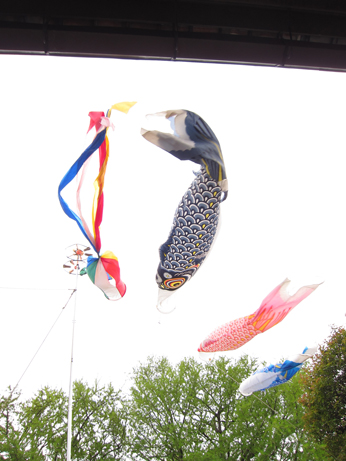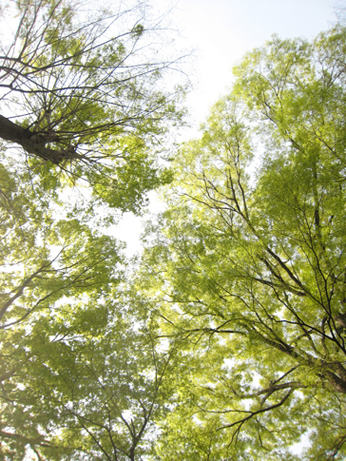
今日も夜遅くに駅から家までの道を歩いていたら、マンションの1階の玄関に段ボール箱が置いてあったので、もうそんな季節になったのかと思った。
それはツバメの落とし物をキャッチするための段ボール箱で、その上を見上げるとツバメの巣がかかっている。ツバメはひとたび気に入って巣をかけると、同じ場所に帰ってくる習性がある。だからツバメが巣をかけた家の住人は、毎年ツバメの子育てを見守ることになる。
家の近所では段ボール箱を活用しているが、新聞で読んだタクシー運転手のおじさんは、毎朝大事な商売道具であるタクシーの屋根から新聞紙を取りのけることから仕事が始まると話していた。しかしそのことを厭(いと)うことなく、むしろツバメが自分の車庫に毎年巣をかけてくれることを自慢するように、にこにこと嬉しそうに語っていた。
こうしてツバメの子育てを陰ながら見守っている人は案外多い。以前泊まった地方のホテルでも、駐車場の暗がりにスーツ姿の男の人がじっと立っていたので驚いたが、駐車場の梁(はり)の陰にあるツバメの巣を見上げていたのだった。男の人は会釈(えしゃく)して行ってしまったが、後で気がつくとフロントの接客係であった。
多くの人は人家や店先や駅の軒先にツバメの巣を見つけても、そのことをわざわざ口にしたりしない。毎日そっと見上げてその成長を見守り、やがて巣立っていくのを見送る。そして心のなかで、来年またおいでと思っている。
昔からツバメが巣をかける家は繁栄するといわれたけれども、その言い伝えが示す意味がよくわかる。小さな生きものを慈しむ気持ち、人々の役に立ってくれることへの感謝、そして自由に空を舞う鳥へのいくばくかの憧れ。自然との共存などという大仰(おおげさ)な言葉を使わなくても、人は昔から自然とともに暮らしていて、それを当然のこととしてきたのである。
それだけに、年々ツバメの姿が減っていて、なぜならそれは地面がアスファルトで覆われて、巣材となる土が見えなくなったことや、散布される農薬によって、餌となる虫がいなくなったことに起因する、といわれていることがやるせない。ツバメの到来を待つ人たちの気持ちは今も昔も変わらないのに、取り巻く状況だけが否応もなく変わっていく。
ツバメは1年のうちの4月から9月頃までの半年ほどを日本で過ごし、秋にはいっせいに移動して東南アジアで暖かい冬を過ごす渡り鳥である。ツバメのその素早い舞姿を再び見るときには、季節はすでに変わっている。
いつものマンションには、土と泥を固めて作った簡素な巣ができていて、卵を産んだばかりなのか、まだつがいだけがそこに入っていて、雄の燕尾服(えんびふく)の先が巣から出っぱって見えていた。小さな生きものは敏感だから、人間が下から見ていることにもすぐ気がつくだろう。寝ているところを邪魔しては悪いので、私はすぐにそこを立ち去った。


Today, too, when I was walking home from the station late at night, there was a cardboard box placed at the entryway of an apartment on the first floor. I wondered whether if it was already that season.
It was a cardboard box to catch the swallow's droppings. When I looked up, there was a swallow's nest. Once swallows build a nest and like it, they have the habit of returning to the same place. Therefore, the residents of the house where the swallow built its nest have to keep an eye on the swallow's parenting every year.
We use cardboard boxes in our neighborhood, but a gentleman who was a taxi driver that I read about in the newspaper said that every morning he started work after removing newspaper from the roof of his taxi, his precious livelihood. However, he didn't say that; rather, he told his story smiling happily as if bragging of the fact that the swallow builds its nest in his garage every year.
There are surprisingly many people who watch from behind-the-scenes swallow's parenting like this. Even at a hotel in the countryside I stayed at previously, I was shocked by a man in a suit standing in the darkness in the parking lot. He was looking up at a swallow's nest in the shadows of the parking lot. The man ran away, but I later realized he was the receptionist staff.
Even if they spot a swallow's nest in front of the stations, stores or people's homes, many don't go out of their way to mention it. Every day they quietly look up at it, watch their growth, and eventually see them off from the nest. Then, in their minds, they think, 'Come again next year.'
It is said that houses where swallows built their nests have thrived since long ago. I understand the meaning meant by this legend. The feeling of caring for small creatures, the gratitude for their being useful to people, and some yearning for birds who dance freely in the sky. Even if they don't use words like 'coexistence with nature', people have lived with nature since long ago, and have made it as a part of their customs.
For that reason, year after year swallows are decreasing, because the earth is being covered by asphalt, and it is disheartening that they say that the reason is the loss of bugs that would be their food by agricultural chemicals being sprayed and the ground that would become the materials for their nests is becoming invisible. Even though the feelings of people who await the swallows' coming have changed neither then nor now, only the circumstances are inevitably changing.
Swallows are migratory birds who spend about half the year in Japan, from about April to September, and then in fall all migrate at once to Southeast Asia to spend a warm winter. The season has already changed when you see the swallows' nimble dancing figures once more.
At the same old apartment, an unadorned nest had been made of compressed dirt and earth. Only the couple was still in there. I could see the male's head sticking out from the nest. Had they just given birth to the eggs? Small creatures are sensitive, so they probably realize right away that humans are watching from below. I left there right away because I shouldn't have interrupted them when they were sleeping.
Interview Article with Mrs. Akiko Wakana >
Day-to-Day Pilosophies




